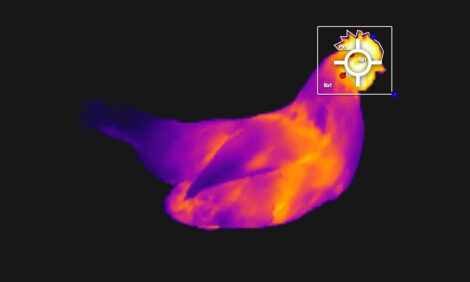



Can Substrate in Early Rearing Prevent Feather Pecking in Adult Laying Hens?
The provision of substrate for pecking in the first three weeks of life did not affect the risk of pullets developing severe feather-pecking behaviour when adult, according to new Dutch research.In the Netherlands, laying hen chicks are often reared without litter on the raised slatted area of a barn system or confined in the aviary system during the first two to five weeks after hatching, with chick paper or chicken wire on the floor, according to Ingrid de Jong and colleagues at Wageningen UR Livestock Research. In the absence of a suitable pecking substrate, they continue, chicks may redirect their pecking behaviour to other birds, which possibly increases the risk of developing feather-pecking behaviour.
The aim of their study - published in the latest issue of the journal, Animal Welfare - was to determine whether housing on wood-shavings (WS treatment; n=15 groups) as compared to housing on chicken wire (CW treatment; n=15 groups) between days one and 20 could reduce feather-pecking in adult birds.
After day 20, all chickens were allowed wood-shavings as litter.
Behavioural observations showed that CW chicks performed significantly less ground-pecking behaviour than WS chicks up to day 20. More CW chicks showed gentle feather pecking on days 7 and 14 than WS chicks, and more CW chicks pecked at the feeder or drinker than WS chicks up to day 20. CW chicks showed rebound behaviour: the day after they were introduced to wood-shavings, they displayed more ground-pecking behaviour than WS chicks.
Later on in the rearing period, no noticeable differences between treatments were found in frequency of gentle and severe feather-pecking bouts.
During laying, more gentle feather-pecking bouts were observed in CW than in WS groups but no differences in severe feather-pecking bouts were observed, nor in feather damage at the end of the trial.
The results indicate that hens can display substantial flexibility in their pecking behaviour and that, despite more gentle feather pecking in CW hens in laying, the absence of substrate in early rearing does not increase the risk of developing severe feather-pecking behaviour when adult.
Reference
De Jong I.C., B.F.J. Reuvekamp and H. Gunnink. 2013. Can substrate in early rearing prevent feather pecking in adult laying hens? Animal Welfare. 22: 305-314. doi: 10.7120/09627286.22.3.305
August 2013








